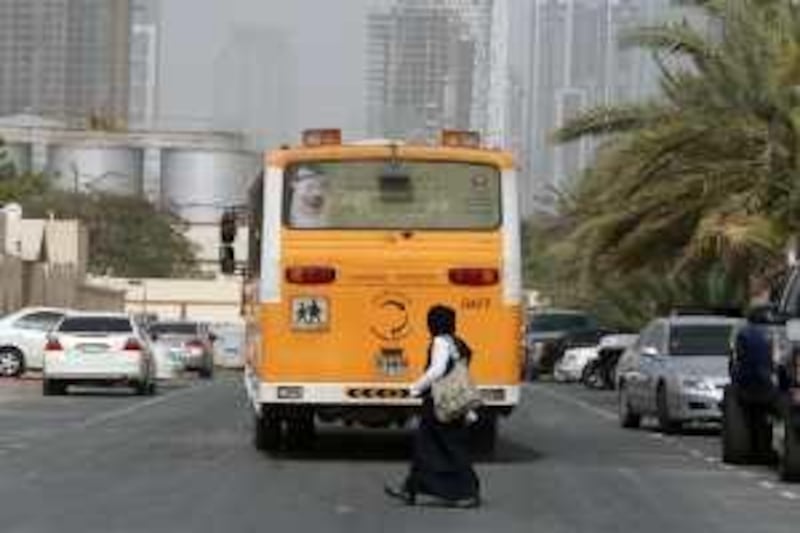New safety regulations for school buses are costing some establishments tens of millions of dirhams, forcing them to raise their transport charges. The rules, which were drafted more than a year ago, went into effect on Tuesday. They require schools and private transport companies to paint buses yellow, install a speed control system that stops the bus from going faster than 80kph, and to ensure that certain seats have safety belts.
The Roads and Transport Authority (RTA) estimates that upgrading should cost no more than Dh17,000 (US$4,600). However, some schools say that a ban on the use of fold-down seats cuts the number of pupils per bus and has compelled them to expand their fleets at a substantial cost. Col ML Augustine, managing director of School Transport Services, a private school bus management service owned by the Varkey Group, which also owns Global Education Management Systems, the largest private school operator in the country, said his company had to buy 45 new buses, each costing about Dh200,000, to compensate for the loss of folding seats. Col Augustine said seven or eight seats had to be removed per bus.
Durairaj Mudhunadar, principal of Buds Private School said his school had to acquire three new and modified 58-seater buses at a cost of Dh320,000. They had previously paid Dh210, 000 for their buses, but the transport company had raised its prices by 50 per cent, he said. Modifying its existing fleet of nine buses had cost Dh13, 000 per bus he said. "The parents find it very difficult and say it is very costly," Mr Mudhunadar said, adding that fees had gone from Dh150 to Dh300. He asked parents to understand that the added cost was to improve safety for their children.
Essa al Dossari, chief executive of the RTA's Public Transport Authority, insisted that many buses would need only "slight" modifications to comply with the rules. He said schools should not increase monthly transport charges by more than Dh300 per student. The rules also specify the amount of space between seats and for the corridor to prevent overcrowding. Although Dubai College, a not-for-profit school, did not have to buy new buses, Richard Higgins, the school's bursar, said costs were significant. "Providing transport is getting more and more expensive and if it continues on like this, quite frankly, we won't be able to afford to do it," he said. "We are a not-for-profit organisation, we don't have huge reserves of cash."
The school raised its bus fees this year by 12 per cent, which Capt Higgins said probably would not cover the cost of upgrades. But because Dubai College did not have to buy additional buses, or do significant upgrades like installing air conditioning, costs were lower than at some other schools. Dubai College had folding seats on only two of its buses and those were not used. "If you asked whether it is a good idea to take those seats out, I would say yes," said Capt Higgins.
"A folding seat is not as safe as a fixed seat. In an emergency, to get out of the bus you need access to the emergency exits or to the door, and if you've got these folding seats in position it makes it extremely difficult." "I understand that the rules they have established and laid down are good rules and are aimed at the worst providers that there are in Dubai," he said. At the City School International Dubai, where capacity has fallen from 34 seats per bus to 26, Arshad Ali, the transport manager, said the school had to acquire four additional buses, bringing the fleet to 14.
Parents would now pay between Dh400 and Dh500 per month this year, where previously they had paid between Dh350 and Dh450. Mr Ali said it cost Dh8,500 to upgrade a single bus. "The cost has gone up because the seating capacity has decreased," he said. "We are not passing it on to the children completely, we have just raised it by 10 per cent and maybe in the coming years we will try to adjust it slowly."
Mr Ali said the increase had not been welcomed by parents, though the school had sent out a circular last year explaining that charges would rise. "It is a problem with the parents actually," he said, "because everyone wants it to go down but it is going up." The school was negotiating with transport companies to purchase new buses and hiring additional vehicles for now, he said. Unfortunately, because other schools were doing the same, transport and hire companies, along with parts suppliers, were charging higher fees, Mr Ali said.
Dhalib Mirza, principal of the Central School in Dubai, said his school had to buy another five buses as a result of the new rules. "If it's an 84-seater only 84 children should be there," he said. Previously, the school carried more than one child per seat. "Now we cannot do it," he said. "We have to have one child, one seat." klewis@thenational.ae






